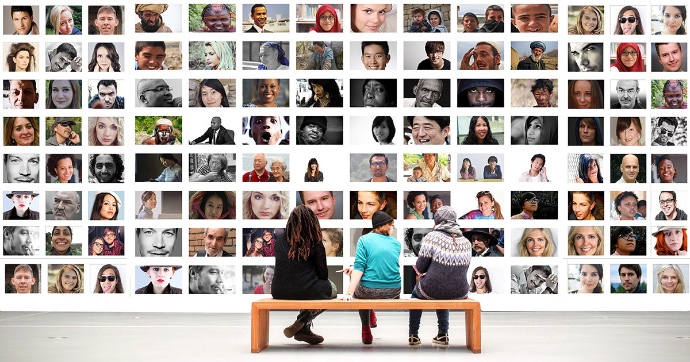
2024 was a year of transformation and progress—for our organization, our member network, and the global development community at large.
In the face of unprecedented change, many organizations demonstrated unrelenting resilience, adapting strategies and innovating to deliver social and environmental impact. Our members adapted to climate change and provided new agricultural practices and programs. Some created new economic opportunities for their communities, while others educated the new workforce for today’s economy. Others enhanced their refugee and IDP resettlement and support programs, and many embraced technologies like artificial intelligence to expand their impact.
As we step into 2025, we are committed to supporting and amplifying this vital work through communities of practice, dynamic events, and new opportunities for connection.
Read on for highlights from 2024 and a preview of what’s to come. Together, let’s create a positive impact in 2025!

Elizabeth Stokely
Executive Director
Table of Contents
Issue Campaigns
Our Issue Campaigns are a monthly focus on a specific topic following one or more SDGs to be educational and inspiring to our readers. The Issue Campaigns are one of our main modalities where we get the chance to research our members’ amazing work and highlight their programs and innovations. It is published as a newsletter and the articles are catalogued on our website as well as shared through our broader social network.

September 2023 – Volodymyr with his daughter, Sasha, 7, in front of his furniture workshop. A husband and father of two, he owned a successful furniture business in his hometown in the Donetsk region. When the danger was too great, the family moved to Dnipro, where Volodymyr had to start his business from scratch. With the help of Mercy Corps’ grant, Volodymyr and his team were able to purchase equipment needed to provide quick, high quality work that helps them to establish their presence as a small business. Photo: Mercy Corps
February – Disaster Relief: Natural disasters across the world are increasing in frequency and intensity, which can be linked to climate change. Scientific modeling predicts that these trends will increase in the future. Thus, the work our Global Washington members engage in to respond and mitigate natural disasters is more important than ever. Our Global Washington members are leveraging advanced technology alongside localized community engagement, which proves to be a powerful approach for building resilience against climate-related disasters in low- and middle-income countries. Here are some key elements used by GlobalWA members and read more in the articles following.
- Digital Infrastructure and Software Resilience: Companies like Amazon and Microsoft leverage digital infrastructure, cloud services, disaster mapping, and AI to enhance disaster response, coordination, and prediction.
- Community Engagement: Organizations like Give2Asia, UNHCR, UNICEF USA, and World Vision emphasize community engagement, education, and empowerment to build resilience from the ground up.
- Humanitarian Aid and Partnerships: Various organizations collaborate with partners, governments, and local communities to provide humanitarian aid, including cash assistance, food security, healthcare, and infrastructure support.
- Long-term Resilience Building: Efforts extend beyond immediate relief to include sustainable livelihoods, infrastructure development, and disaster risk reduction to ensure long-term resilience.
Issue Brief: Growing a Stronger Tomorrow: Impactful Approaches to Long-Term Climate Resilience
Organization Profile: Mercy Corps is Helping Ukrainians Feed, Clothe, and Earn for Themselves
Goalmaker: Empowering Resilience: Cabdinasir Adan
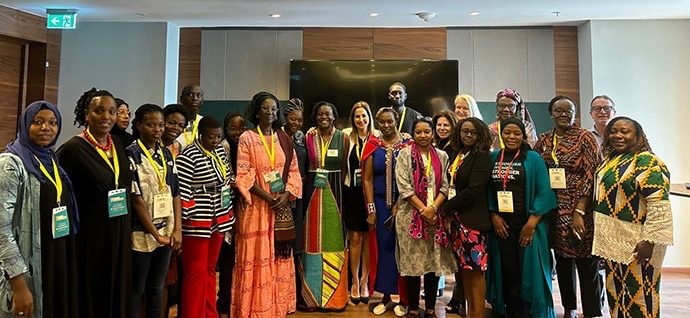
Every Woman Treaty at the Women Deliver conference, Kigali, Rwanda, July 2023. Photo: Every Woman Treaty
March – Gender Equality: On March 8, the world celebrated International Women’s Day and the need for a global, inclusive movement to value gender equality. While progress has been made, we are not on track to achieve the targets outlined in the Sustainable Development Goals (SDGs) by 2030. More must be done. In fact, gender equality is interconnected with, and is the foundation of, numerous SDGs and could unlock the potential to improve lives in low- and middle-income countries.
Several Global Washington member organizations and Pangea Giving partners are addressing gender equality with multifaceted approaches, such as data disaggregation, primary education of girls, crisis support, food security, financial inclusion, rule of law, health, women in leadership, and advocacy. These efforts aim to empower women and girls, challenge gender norms, and combat violence and discrimination.
There are also several Pangea Giving partners in Africa, Southeast Asia, and Latin America that are working with local communities in rural areas on fundamental aspects of gender equality. You can read more about these grassroots organizations below.
Last December, Ghanaian author and advocate Yawa Hansen-Quao spoke about the power of girls when they find their voice to become leaders in their communities. You can watch her presentation here from the 2023 Goalmakers Conference and view other recorded sessions from the conference here.
Issue Brief: Achieving Gender Equality Through Data, Government, and Communities
Organization Profile: Every Woman Treaty: Charting a Historic Path towards Ending Violence Against Women and Girls
Goalmaker: Meera Satpathy: Founder and Chairperson, Sukarya
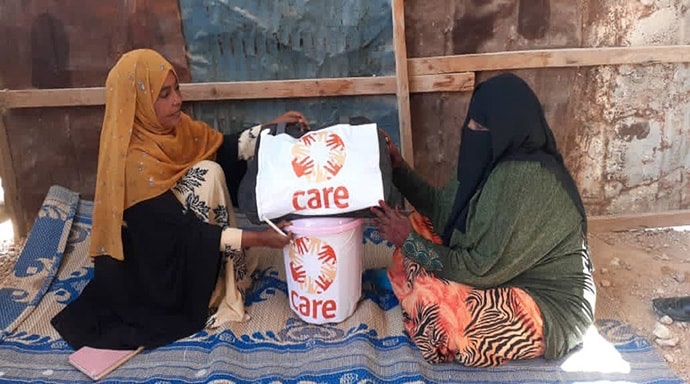
Habib (in green) receives a CARE package from a CARE staff member at an IDP camp. Divorced women face stigmatization due to their married status and CARE offers psychosocial support to them. Photo: CARE
April – Refugees: Amidst the violence of recent global events, I am finding hope from Global Washington members providing shelter from the storm for refugees. There are over 110 million refugees and displaced people worldwide, the highest number on record since 1951. However, GlobalWA members provide vital programs, credible advocacy, and build awareness of the plight of refugees at different stages of their journey.
The statistics can be overwhelming, but when you read about the effective programs reaching children and families, it brings hope for the future. Here are some programs being provided by GlobalWA members:
Safe Passage for Children: Efforts to support refugee children and families during transit, including providing basic necessities, psychosocial support, and child-friendly spaces.
Shelter and Health: Initiatives to provide healthcare, education, and support services to refugees in camps and host communities, addressing their basic needs and long-term well-being.
Relocation and Resettlement: Programs facilitating the relocation and integration of refugees into new communities, including sponsorship programs and evacuation efforts in crisis situations.
Job Training: Efforts to empower refugees through employment opportunities, vocational training, mentorship programs, and tech-focused job training, aiming to help them rebuild their lives and contribute to their new communities.
Please also listen to our interview with IRC Washington’s Executive Director Kathleen Morris on the GlobalWA podcast here. It is a good reminder that refugees are our neighbors, my kid’s classmates, and part of our thriving communities. It is also important to understand the root causes and why refugees are forced to leave their homes.
Issue Brief: Creating a World Where Refugees Feel Welcomed, Empowered, and Embraced
Organization Profile: Empowering Communities: CARE’s Response to the Global Crisis of Internally Displaced People
Goalmaker: Emi Mahmoud, UNHCR Goodwill Ambassador
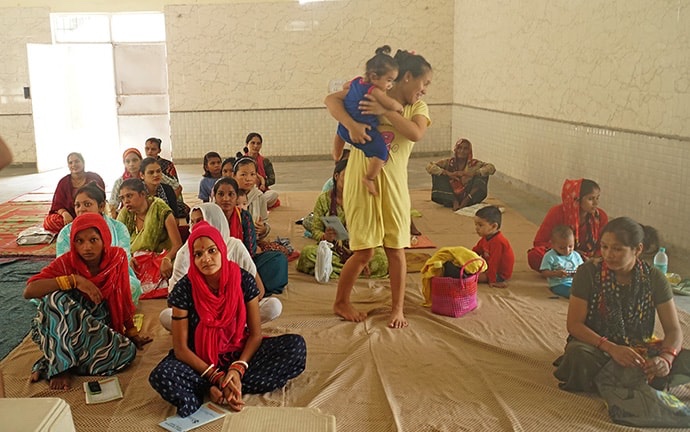
Women waiting for pre- and post-natal care at a Sukarya health clinic, Haryana, India. Photo: Joel Meyers
May – Global Health: When we think about global health, we might not specifically think about women’s health, but women spend 25% more time with significant health issues than men. This time adds up to approximately nine years over a lifetime – nine years! The term Disability Adjusted Life Years, or DALYs, represents the loss of one year of full health. This means collectively women have lost 75 million DALYs, or years of full health. That’s astounding. Why is this?
A major part of it comes from a lack of effective health interventions designed specifically for women. For instance, only 4% of pharmaceutical R&D spending goes to female-specific conditions versus approximately 75% of National Institutes of Health funding that goes to a disease affecting one gender goes to male diseases. To add to the issue, 75% of clinical trial participants are men.
Economically, the benefits of closing this health gap are immense. For every dollar spent, there’s a potential $3+ return in economic growth, which would boost the global economy by more than $1 trillion a year by 2040. GlobalWA partners are doing incredible work to close this gap as part of a growing commitment to change the status quo.
Issue Brief: Narrowing Women and Girls’ Health Equity Gap
Organization Profile: Providence Global Programs
Goalmaker: Behind the Numbers: Rachel Ndirangu’s Personal Journey to Close the Gender Health Gap
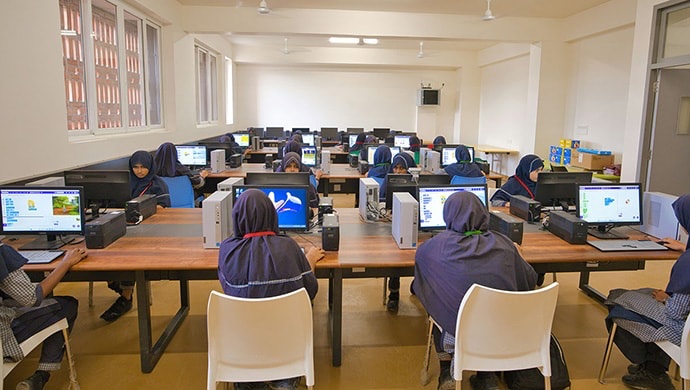
Secondary school computer lab, Chennai, India. Photo: Haseeb Modi/Unsplash
June – Decent Work: In this month’s Issue Brief we deep dive into how our members are addressing SDG 1 “No Poverty” and SDG 8 “Decent Work and Economic Growth,” with a specific eye on how members are leveraging new technologies (such as AI), digital skills development, closing the gender work gap, and creating new opportunities in this ever-changing landscape of technological change.
To understand the evolving workforce challenges, we talked with Ama Akuamoah, Director of Market Engagement of the Digital Innovation Group at Opportunity International who has direct on-the-ground involvement delivering solutions to final-mile communities. We also had a revealing conversation with Naria Santa Lucia, General Manager of Digital Inclusion at Microsoft Philanthropies who talked about the importance of upskilling communities with digital technologies, services, and products to ensure no one is left behind.
The programs and interventions GlobalWA members are implementing in communities where they work are exemplifying a new standard and are setting a hopeful course for current and future generations.
Issue Brief: The Future of Work
Organization Profile: Stronger Tomorrow: Integral Efforts by Microsoft to Build Digital Capacities and Technological Proficiency
Goalmaker: Ama Akuamoah, Director of Market Engagement, Digital Innovation Group, Opportunity International
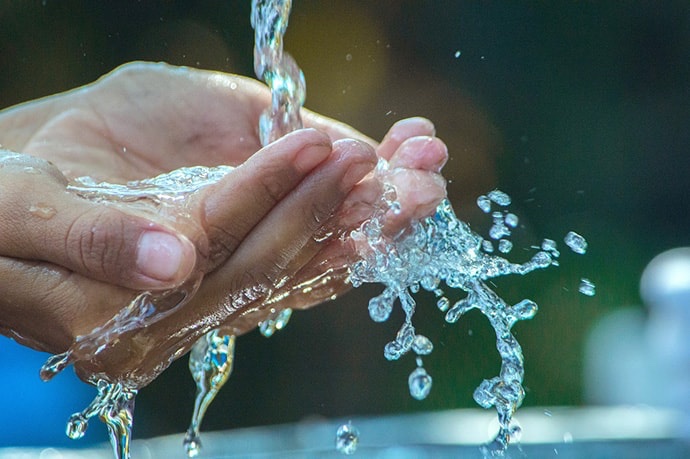
Photo: drfuenteshernandez/Pixabay
July – Safe Water: Unsafe water, inadequate sanitation, and insufficient hygiene kill 3.5 million people every year, and water scarcity affects more than 40% of the global population. These are staggering numbers, yet GlobalWA members show an amazing amount of ingenuity and resourcefulness when it comes to ensuring WASH in the communities where they work.
In our Issue Brief you will read about how our members have created key partnerships, innovative solutions, and strong monetary commitments to ensure safe water, appropriate hygiene, and innovative waste and sanitation solutions in low- and middle-income communities.
Included are also articles about a key partnership between World Vision and Rotary International safeguarding water for communities in Ethiopia, as well as a revealing interview with a Ugandan WASH expert from The Hunger Project.
GlobalWA members illustrate amazing adaptive solutions in the face of climate change, growing and shifting populations, and the need for new innovations. We hope you will be as inspired as we are!
Issue Brief: Closing the Resource Gap: How Clean Water Changes Lives
Organization Profile: Joint Interventions for Ethiopia’s Water Crisis: World Vision partners with the Rotary Foundation
Goalmaker: Ibrahim Ogaram, Food Security and Nutrition Officer, The Hunger Project Uganda
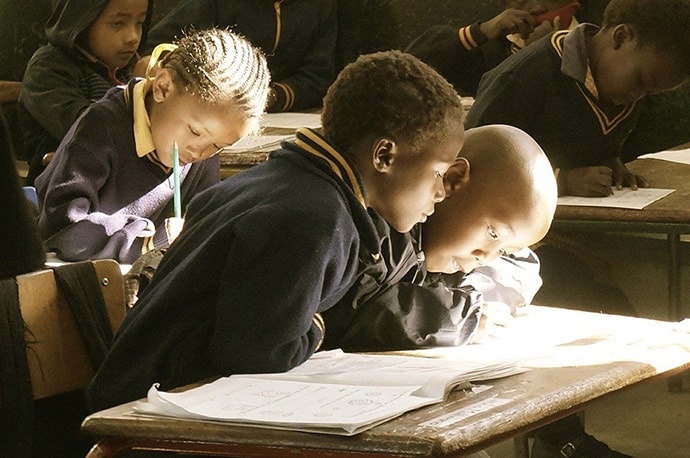
Ugandan children during class exercises. Photo: ludi/Pixabay
August – Quality Education: Many consider SDG 4, Quality Education to be the foundation of all the SDGs, and for good reason. Education is the path to local and global awareness, critical thinking, and self-actualization. It is a key that unlocks imagination and liberates the intellect. Through education people become empowered to create opportunity and break the cycle of poverty.
Yet, when children are kept out of school to help farm, or because of disasters, conflict or gender discrimination, it is not only the children who suffer, but the communities as well.
GlobalWA members are aware of these constant and ever-evolving challenges and lean into tried-and-true methods for creating and promoting education, and some have developed inventive solutions.
We hope you enjoy reading about how our members are supporting SDG 4, Quality Education for all. From micro-loans to mobile schools, our members are exemplary for finding paths to provide education in the communities where they work.
Issue Brief: SDG 4 Quality Education
Organization Profile: Global Reach, Local Impact: How Committee for Children International Expands SEL Worldwide
Goalmaker: Nirmala Chaudhary, Nepal Country Director, buildOn
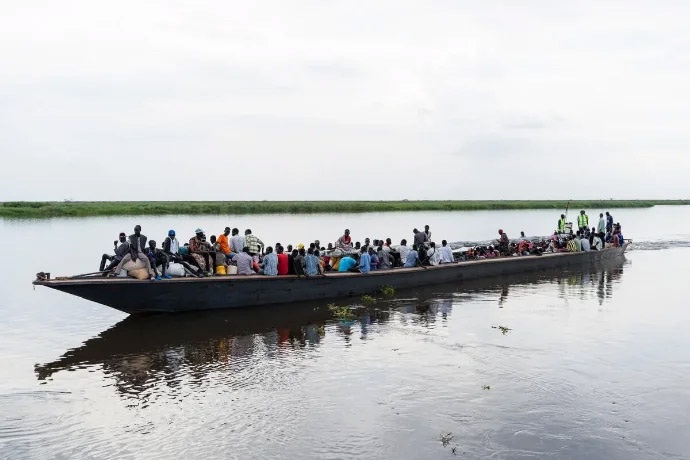
Sudanese refugees and South Sudanese returnees travel on a crowded barge from Renk to Malakal, South Sudan. The journey will take two days. © UNHCR/Ala Kheir
September – Issue Campaign Special Edition: Refugees and IDPs: Refugees and internally displaced persons (IDPs) do not choose to leave their homes – it is an action they are forced to do. To date, nearly 120 million people have been forced to escape armed conflict, generalized violence, human rights abuses, or natural or man-made disasters. This is a 200% increase since I began working on this issue in 2012.
These numbers are unprecedented and sobering. As a part Women of the World’s 2024 focus on refugees, we are publishing this Special Edition Issue Campaign on the plight of refugees and IDPs today. We have been given special permission to republish the UNHCR, The UN Refugee Agency’s Global Trends summary report while also diving into how our members, Oxfam and Global Communities, are assisting refugees in their programs. We are encouraged to hear about how our other members are helping refugees and IDPs through short summaries that are also included here.
Issue Brief: Refugees: Global Trends
Organization Profile: Oxfam – Helping Refugees Since its Inception
Goalmaker: Empowering Resilience: Supporting Women and Children amid Ukraine’s Conflict
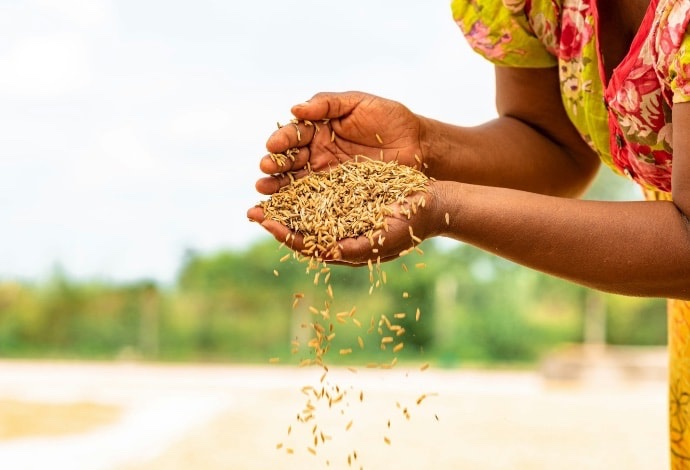
Tanzanian woman pouring harvested rice from her hands. Photo: Ali Mkumbwa/UnSplash
October – Food Security: Almost 30 percent of the world’s population, or 2.4 billion people, are moderately or severely food insecure. Though the world is off track to achieve SDG 2 – Zero Hunger by 2030, there has been progress. The agricultural finance solutions, climate resilient practices, new mobile platforms, and other innovations illustrated below in our Issue Brief hold promise as effective and sustainable models.
We had the pleasure of talking with Neena Joshi, Senior Vice President of Asia Programs at Heifer International, for our Goalmaker feature and learned about how cooperatives can accelerate progress for smallholder farmers. Landesa is our Organization Spotlight this month and highlights the direct relationship between land rights and food security.
Issue Brief: The Methods our Members are Employing to Ensure Food Security
Organization Profile: Landesa
Goalmaker: Strength in Numbers: How Neena Joshi is Elevating Asia’s Women Farmers
Back to Top
Member Guest Blogs
Each month we invite members to submit blogs they write to supplement our Issue Campaigns. Blogs are shared in our newsletter and shared across our social media communities.
On Food Security:
On Refugees and Disaster Relief:
On Quality Education:
On Safe Water:
On Decent Work:
On Global Health:
On Gender Equality:
Back to Top
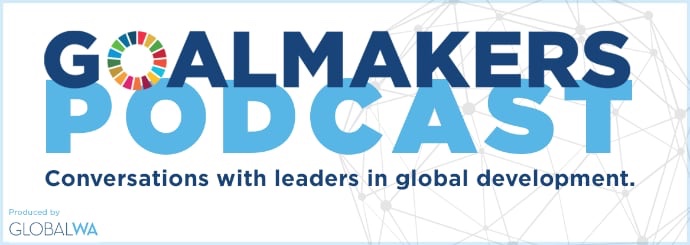
Goalmaker Podcast
Goalmakers is a series of powerful stories and talks about global development and international affairs as told by leaders, experts, and practitioners – from our Global Washington membership.
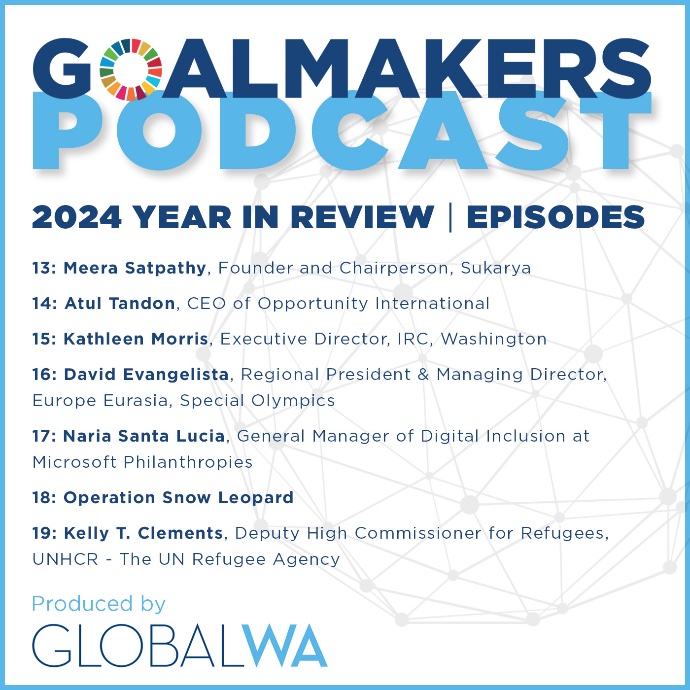
Back to Top

Pangea Giving
Pangea Giving is a giving circle that connects our community to direct, thoughtful, and impactful ways to engage in trust-based partnerships with grassroots organizations across the Global South. Together, we work to enhance the quality of life in communities worldwide.
In 2024, we proudly supported 18 grant partners with a combined total of $124,100. Our partners in East Africa, Latin America, and Southeast Asia continue to drive incredible change, and we are honored to contribute to their efforts. This year, we welcomed a new partner, Voces y Manos, an inspiring organization dedicated to fostering buen vivir—the concept of “good living.” They empower communities by nurturing social leadership and promoting ancestral agroecological practices, restoring harmony between generations and the natural world.
In 2024, we also organized two impactful site visits: one to Southeast Asia and another to Guatemala. Read the site visit report to SE Asia here. The Guatemala site visit report will be published soon.
Additionally, we were thrilled to welcome four new members into the Pangea Giving community.
At this year’s Goalmakers Conference, we proudly highlighted powerful grassroots voices during our Virtual Session. Special guests Jules Mayele from Uganda and longtime partner Joshua Machinga from Kenya shared profound insights into the successes and challenges of grassroots development. You can watch the recording here: Goalmakers 2024 Dec. 3rd – Pangea Lunch and Learn and Closing Remarks.
Back to Top
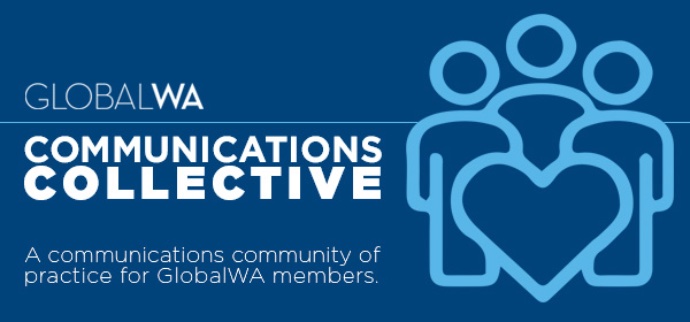
Communications Collective
The GlobalWA Communications Collective is an initiative to create community for GlobalWA member communications professionals to gather, learn, and support each other regarding communications and marketing best practices, new technologies, strategies, and techniques.
We held three sessions in 2024, starting with a members-only workshop titled “How to Create a Strong Messaging Framework as the Foundation for All Your Communications” where we discussed and workshopped how to create the building blocks of messaging for all communications within and externally of an organization. Participants were walked through various elements such as defining their value proposition(s), determining their audience(s), goals, and the differences between communication channels, defining the “ask”, and determining audience barriers for engagement and how to respond to those barriers.
Though the Communications Collective is predominantly for GlobalWA members only, we offered free a webinar to all on “The Secret Behind Crafting Stronger Stories” where our member, Stronger Stories, walked us through the elements that create compelling stories, the archetypes of good stories, and examples of stronger stories. You can watch a recording of that session here.
Closely following the webinar was a full-house, in-person workshop where Stronger Stories took participants even deeper into crafting stronger stories in a session titled “Turning Strategy into Story” including an exercise to craft an ideal elevator pitch.
Back to Top
2025 Global Philanthropy Guide
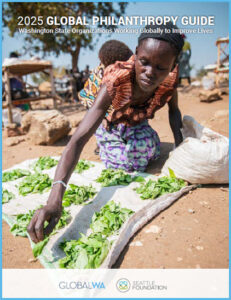 In this year’s edition of the Philanthropy Guide, we shine a spotlight on one of the most pressing humanitarian issues of our time: the global refugee crisis. According to the United Nations, there are currently more than 120 million forcibly displaced people worldwide, including over 35 million refugees. In the last decade, more than 30,000 of these refugees from over 70 countries have resettled in Washington state. Driven from their homes by conflict, persecution, climate change, and economic instability, these individuals and families are seeking safety, stability, and a chance to rebuild their lives.
In this year’s edition of the Philanthropy Guide, we shine a spotlight on one of the most pressing humanitarian issues of our time: the global refugee crisis. According to the United Nations, there are currently more than 120 million forcibly displaced people worldwide, including over 35 million refugees. In the last decade, more than 30,000 of these refugees from over 70 countries have resettled in Washington state. Driven from their homes by conflict, persecution, climate change, and economic instability, these individuals and families are seeking safety, stability, and a chance to rebuild their lives.
Refugees are among the most vulnerable populations, facing numerous challenges—from access to basic needs such as food, water, and shelter, to more complex barriers like legal rights and social integration. However, they also possess incredible resilience, courage, and the potential to contribute to their host communities when given the opportunity.
The global refugee crisis demands not just compassion, but action. The organizations featured in this guide are rising to the challenge, offering hope and dignity to millions of displaced people across the globe. We encourage you to read their stories, learn more about their work, and explore how you can get involved.
In addition, at the back of this guide, you will find a full directory of Global Washington’s 112 members, including descriptions of their work and how to connect with them.
Back to Top
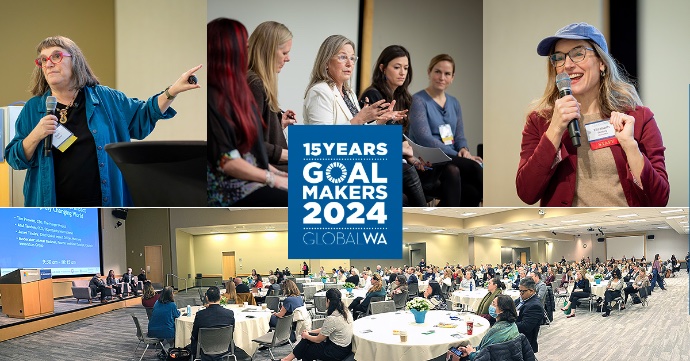
Goalmakers 2024 15th Annual Conference
Goalmakers 2024, our 15th Annual Conference, Dec. 3-4, was a truly memorable experience, and from the comments we have received so far the conference added a tremendous amount of value for our attendees.
We had 26 sessions consisting of engaging panels, interactive workshops, and revealing plenary talks led by 46 experts from across the spectrum of philanthropy, fundraising, communications, and leadership.
We came together, discussed the world as it is today, and our visions, strategies, and tactics of how to improve lives in low and middle-income countries in the years to come. An incredible and uplifting experience!
View recordings of our Virtual Day on Dec. 3, and photos of our Dec. 4, In-Person Day. A comprehensive after-conference summary report will be released soon.
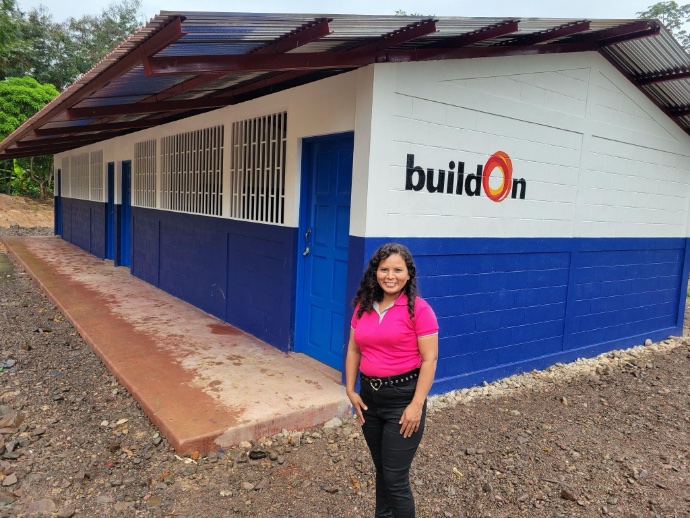
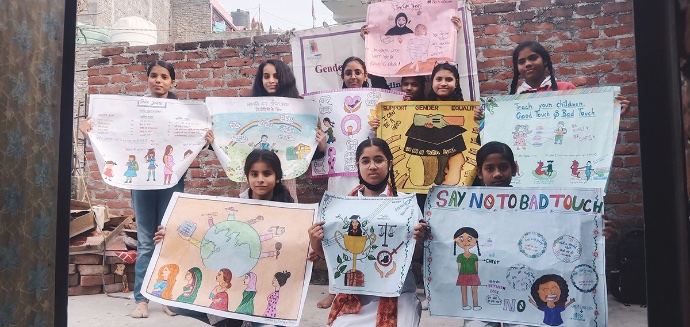
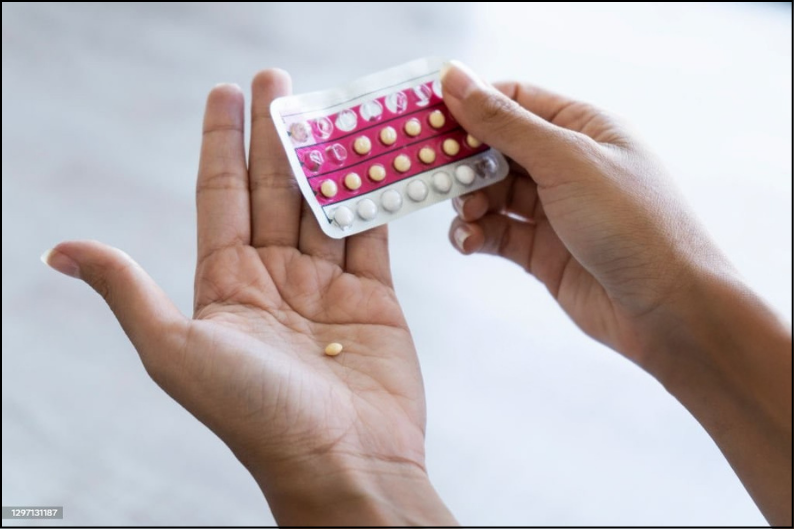
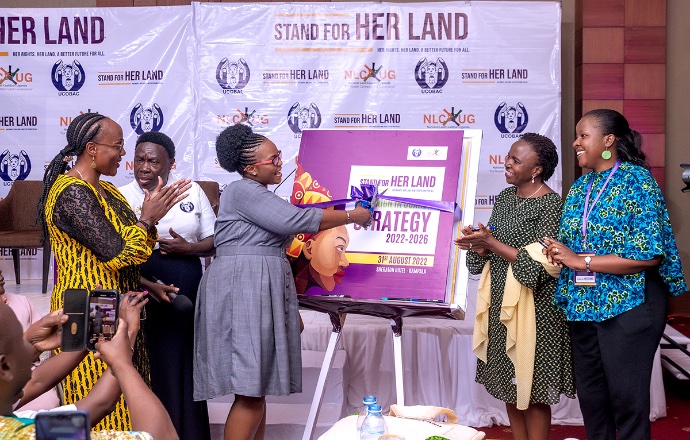
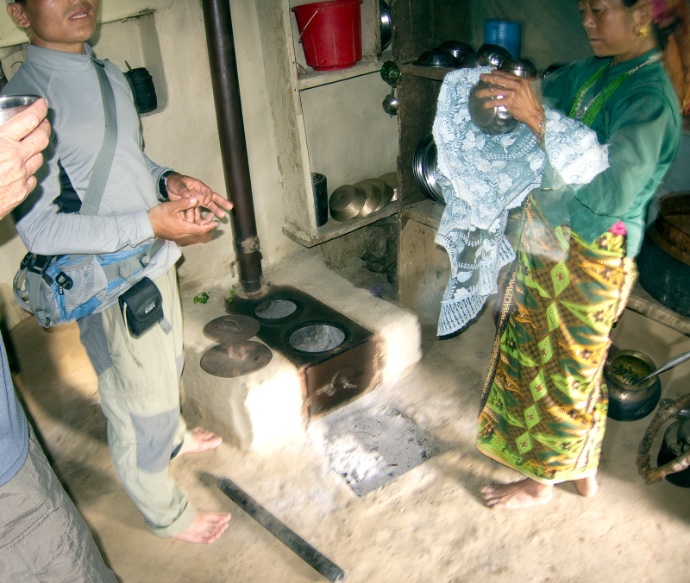
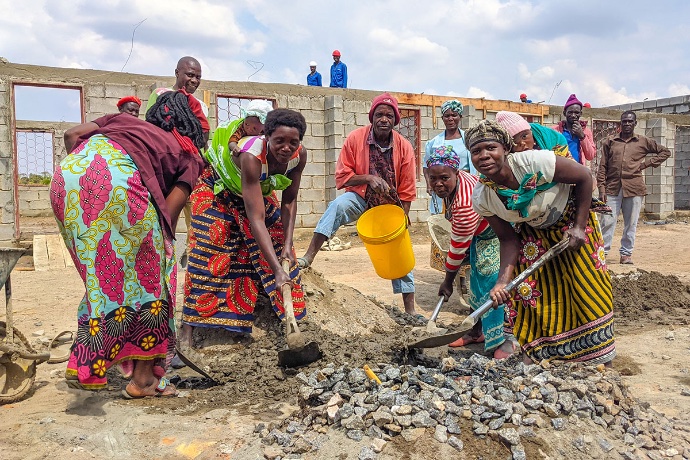
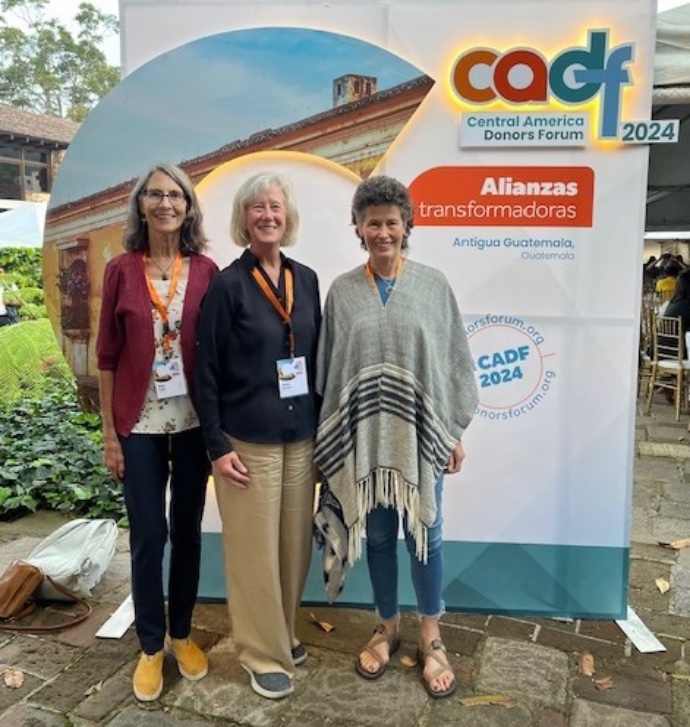
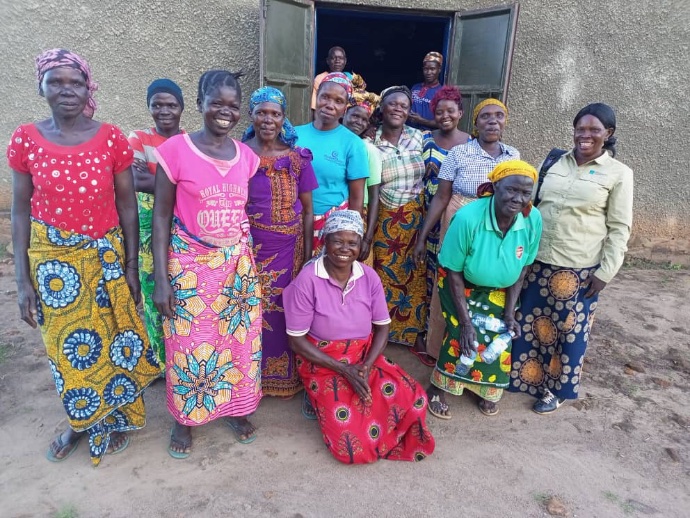















 In this year’s edition of the
In this year’s edition of the 